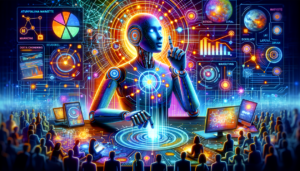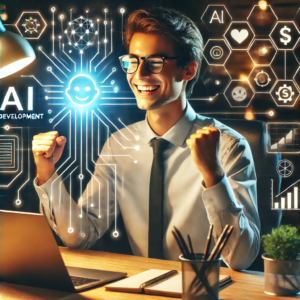10 Best AI Tools for Business You Can’t Afford to Ignore
In today’s rapidly evolving business landscape, staying ahead of the competition means embracing the power of artificial intelligence (AI).
As companies strive to streamline operations, boost productivity, and make data-driven decisions, the best AI tools for business have become indispensable assets.
These innovative solutions are transforming the way organizations function, from automating routine tasks to providing deep insights that drive strategic planning.
In this comprehensive guide, we’ll explore the top 10 AI tools that are revolutionizing businesses across various industries.
These cutting-edge technologies offer a wide range of capabilities, from natural language processing and machine learning to predictive analytics and robotic process automation.
By leveraging these powerful AI tools, businesses can unlock new levels of efficiency, accuracy, and innovation.
Whether you’re a small startup or a large enterprise, these AI solutions have the potential to dramatically impact your bottom line and propel your company into the future.
Let’s dive into the world of AI and discover the tools that are reshaping the business landscape.
We strongly recommend that you check out our guide on how to take advantage of AI in today’s passive income economy.
Table of Contents
1. ChatGPT: The AI-Powered Conversational Revolution
Enhancing Customer Interactions and Content Creation
ChatGPT, developed by OpenAI, stands at the forefront of natural language processing and generation.
This powerful AI tool has quickly become one of the best AI tools for business, offering a wide range of applications across various sectors.
From customer service chatbots to content creation and language translation, ChatGPT’s capabilities are truly transformative.
By leveraging advanced machine learning algorithms, ChatGPT can understand context, generate human-like responses, and even assist with complex problem-solving tasks.
For businesses, this means improved customer interactions, faster response times, and the ability to create high-quality content at scale.
Marketing teams can use ChatGPT to brainstorm ideas, draft social media posts, and even generate product descriptions, significantly streamlining their workflow.
Customer support departments can implement ChatGPT-powered chatbots to handle routine inquiries, freeing up human agents to focus on more complex issues.
2. IBM Watson: The Cognitive Computing Powerhouse
Unleashing Data-Driven Insights for Informed Decision Making
IBM Watson has long been recognized as one of the best AI tools for business, particularly when it comes to advanced analytics and cognitive computing.
This versatile platform offers a suite of AI-powered tools that can be applied to various business functions, from data analysis to predictive modeling.
Watson’s natural language processing capabilities allow it to understand and interpret vast amounts of unstructured data, including text, images, and audio.
For businesses, this means the ability to extract valuable insights from diverse data sources, leading to more informed decision-making processes.
Healthcare organizations use Watson to analyze medical literature and patient data, assisting in diagnoses and treatment recommendations.
Financial institutions leverage Watson’s predictive analytics to assess risk and detect fraudulent activities, enhancing their security measures.
By harnessing the power of IBM Watson, businesses can tap into the full potential of their data, uncovering patterns and trends that drive strategic growth.
3. Salesforce Einstein: AI-Powered Customer Relationship Management
Personalizing Customer Experiences and Optimizing Sales Processes
Salesforce Einstein is a prime example of how AI is revolutionizing customer relationship management (CRM) systems.
As one of the best AI tools for business in the sales and marketing realm, Einstein brings predictive analytics and machine learning to the Salesforce platform.
This powerful AI assistant analyzes vast amounts of customer data to provide sales teams with actionable insights and recommendations.
Einstein can predict which leads are most likely to convert, suggest the best times to contact prospects, and even automate routine tasks like data entry.
For marketing teams, Einstein offers advanced segmentation capabilities, allowing for highly targeted and personalized campaigns.
The AI-powered tool can also analyze customer behavior patterns to predict future actions, helping businesses stay one step ahead of their clients’ needs.
By integrating Salesforce Einstein into their CRM processes, companies can significantly enhance their customer relationships and drive sales growth.
4. Google Cloud AI Platform: Scalable Machine Learning Solutions
Democratizing AI Development for Businesses of All Sizes
Google Cloud AI Platform has established itself as one of the best AI tools for business, offering a comprehensive suite of machine learning and AI development tools.
This powerful platform provides businesses with the infrastructure and resources needed to build, deploy, and scale AI models efficiently.
From pre-trained models for common use cases to custom model development, Google Cloud AI Platform caters to a wide range of AI needs.
The platform’s AutoML feature allows even non-technical users to create high-quality machine learning models, democratizing AI development across organizations.
For data scientists and AI developers, the platform offers advanced tools for deep learning, natural language processing, and computer vision.
Businesses can leverage these capabilities to enhance product recommendations, improve search functionality, and automate image and video analysis.
By utilizing Google Cloud AI Platform, companies can accelerate their AI initiatives and gain a competitive edge in their respective markets.
5. Microsoft Azure AI: Comprehensive AI Services for Enterprise Solutions
Empowering Businesses with Advanced AI Capabilities
Microsoft Azure AI stands out as one of the best AI tools for business, especially for enterprises looking for a robust and scalable AI infrastructure.
This comprehensive platform offers a wide array of AI services, including machine learning, cognitive services, and bot services.
Azure Machine Learning enables data scientists to build, train, and deploy models at scale, supporting the entire machine learning lifecycle.
The platform’s cognitive services provide pre-built APIs for vision, speech, language, and decision-making tasks, allowing businesses to easily integrate AI into their applications.
Azure Bot Service facilitates the creation of intelligent chatbots that can engage with customers across multiple channels, enhancing customer support and engagement.
For businesses dealing with large-scale data processing, Azure Databricks offers a collaborative analytics platform optimized for big data and machine learning.
By leveraging Microsoft Azure AI, enterprises can accelerate their AI adoption and drive digital transformation across their organization.
6. TensorFlow: Open-Source Machine Learning Framework
Empowering Developers to Build and Deploy AI Models
TensorFlow, developed by Google, has become one of the best AI tools for business, particularly for organizations looking to develop custom AI solutions.
This open-source machine learning framework provides a flexible ecosystem of tools, libraries, and community resources for building and deploying AI models.
TensorFlow’s versatility allows it to be used for a wide range of applications, from image and speech recognition to natural language processing and predictive analytics.
The framework’s high-level APIs make it accessible to developers with varying levels of machine learning expertise, while still offering advanced capabilities for experienced data scientists.
TensorFlow’s ability to run on multiple CPUs and GPUs makes it suitable for both small-scale projects and large-scale, distributed computing environments.
For businesses, this means the ability to develop and deploy AI models that can process vast amounts of data and make real-time predictions.
By adopting TensorFlow, companies can create custom AI solutions tailored to their specific needs, driving innovation and competitive advantage.
7. RPA Tools: Automating Repetitive Tasks for Enhanced Efficiency
Streamlining Business Processes with Intelligent Automation
Robotic Process Automation (RPA) tools have emerged as some of the best AI tools for business, offering significant improvements in operational efficiency.
These intelligent automation solutions use software robots or “bots” to perform repetitive, rule-based tasks that previously required human intervention.
Leading RPA platforms like UiPath, Automation Anywhere, and Blue Prism combine AI and machine learning capabilities to create more sophisticated automation workflows.
By automating routine tasks such as data entry, report generation, and invoice processing, RPA tools free up employees to focus on higher-value activities.
These tools can work 24/7 without errors, significantly reducing processing times and improving accuracy in various business processes.
RPA solutions are particularly valuable in industries with high volumes of repetitive tasks, such as finance, healthcare, and manufacturing.
By implementing RPA tools, businesses can achieve substantial cost savings, improve compliance, and enhance overall operational efficiency.
8. Tableau: Data Visualization and Business Intelligence
Transforming Raw Data into Actionable Insights
Tableau has established itself as one of the best AI tools for business when it comes to data visualization and business intelligence.
This powerful platform allows organizations to connect to various data sources, analyze complex datasets, and create interactive visualizations.
Tableau’s intuitive interface makes it accessible to users with varying levels of technical expertise, democratizing data analysis across organizations.
The platform’s AI-powered features, such as Ask Data and Explain Data, enable users to interact with data using natural language queries and receive automated insights.
For businesses, this means the ability to quickly identify trends, patterns, and outliers in their data, leading to more informed decision-making.
Tableau’s robust sharing and collaboration features facilitate the dissemination of insights throughout the organization, fostering a data-driven culture.
By leveraging Tableau’s capabilities, companies can transform raw data into compelling visual stories that drive strategic action and business growth.
9. Grammarly: AI-Powered Writing Assistant
Enhancing Communication and Content Quality
Grammarly has emerged as one of the best AI tools for business in the realm of written communication and content creation.
This AI-powered writing assistant goes beyond simple spell-checking, offering advanced grammar, style, and tone suggestions to improve the quality of written content.
For businesses, Grammarly ensures that all external communications, from emails to marketing materials, maintain a high level of professionalism and clarity.
The tool’s ability to adapt to different writing styles and purposes makes it valuable across various departments, from HR to customer service.
Grammarly’s AI algorithms continuously learn and improve, providing increasingly accurate and contextually relevant suggestions over time.
The platform’s enterprise solutions offer additional features such as style guides and analytics, helping maintain brand consistency and track writing improvement across teams.
By implementing Grammarly, businesses can significantly enhance their written communication, leading to better customer relationships and a stronger brand image.
10. DataRobot: Automated Machine Learning Platform
Accelerating AI Adoption with Automated Model Development
DataRobot stands out as one of the best AI tools for business, particularly for organizations looking to accelerate their AI and machine learning initiatives.
This automated machine learning platform enables businesses to build and deploy predictive models quickly, without requiring extensive data science expertise.
DataRobot automates many of the complex steps involved in machine learning, including feature engineering, algorithm selection, and model tuning.
For businesses, this means the ability to develop AI-driven solutions faster, allowing them to respond more quickly to market changes and customer needs.
The platform’s user-friendly interface makes it accessible to business analysts and domain experts, bridging the gap between technical and non-technical teams.
DataRobot’s enterprise AI platform offers additional features such as model monitoring, governance, and explainable AI, ensuring responsible and transparent AI deployment.
By leveraging DataRobot, companies can democratize machine learning across their organization, driving innovation and data-driven decision-making at all levels.
Conclusion
As we’ve explored in this comprehensive guide, the best AI tools for business are revolutionizing the way companies operate across various industries.
From natural language processing and machine learning to data visualization and automated model development, these AI solutions offer unprecedented capabilities.
By leveraging tools like ChatGPT, IBM Watson, Salesforce Einstein, and others, businesses can enhance customer interactions, streamline operations, and make data-driven decisions.
The power of AI extends to every aspect of business, from sales and marketing to finance and human resources.
As AI technology continues to evolve, staying informed about the latest tools and their applications will be crucial for maintaining a competitive edge.
The best AI tools for business not only solve current challenges but also open up new possibilities for innovation and growth.
By embracing these AI solutions, companies can position themselves at the forefront of their industries, ready to tackle the challenges and opportunities of the future.
The journey towards AI adoption may seem daunting, but the potential rewards in terms of efficiency, productivity, and innovation are immense.
Frequently Asked Questions (FAQ)
What is the best AI tool to start a business?
The best AI tool to start a business depends on your specific needs, but ChatGPT is often an excellent choice for many startups.
It can help with various tasks such as content creation, market research, and customer service automation.
For data analysis and decision-making, tools like Tableau or Google Cloud AI Platform could be valuable.
If you’re focusing on sales and customer relationships, Salesforce Einstein might be the best option.
Ultimately, the best tool will depend on your business model, industry, and specific goals.
It’s often beneficial to start with a versatile tool like ChatGPT and expand your AI toolkit as your business grows and your needs become more specialized.
Which AI is better than ChatGPT?
It’s challenging to say that any AI is definitively “better” than ChatGPT, as each tool has its strengths and is designed for specific purposes.
ChatGPT excels in natural language processing and generation, but other AIs might outperform it in different areas.
For instance, IBM Watson might be superior for complex data analysis and cognitive computing tasks.
Google’s BERT or T5 models might perform better in certain language understanding tasks.
In image recognition or computer vision, tools like Google Cloud Vision AI or Amazon Rekognition might be more suitable.
The “best” AI depends on the specific task or application you have in mind.
It’s often more productive to think about which AI is the most appropriate for your particular needs rather than which is universally “better.”
What is the best tool for AI?
The “best” AI tool varies depending on the specific application and user requirements.
For general-purpose AI tasks, especially those involving language, ChatGPT is a popular and versatile choice.
TensorFlow is widely regarded as one of the best tools for developing custom machine learning models.
For business intelligence and data visualization, Tableau is often considered a top choice.
In the realm of automated machine learning, platforms like DataRobot are highly regarded.
For enterprise-level AI integration, solutions like Microsoft Azure AI or Google Cloud AI Platform are among the best.
The best tool for you will depend on factors such as your technical expertise, specific AI needs, budget, and scalability requirements.
It’s often beneficial to evaluate multiple tools and possibly use a combination to meet all your AI needs.
How can AI be used for business?
AI can be used in numerous ways to enhance business operations and drive growth:
- Customer Service: AI-powered chatbots can handle customer inquiries 24/7, improving response times and customer satisfaction.
- Data Analysis: AI tools can process vast amounts of data to uncover insights, trends, and patterns that inform business decisions.
- Predictive Analytics: AI can forecast market trends, customer behavior, and potential risks, aiding in strategic planning.
- Automation: AI can automate repetitive tasks, freeing up human resources for more complex, creative work.
- Personalization: AI can analyze customer data to provide personalized product recommendations and marketing messages.
- Fraud Detection: In finance and e-commerce, AI can identify unusual patterns that may indicate fraudulent activity.
- Supply Chain Optimization: AI can predict demand, optimize inventory levels, and improve logistics efficiency.
- Human Resources: AI can assist in resume screening, employee performance analysis, and personalized training recommendations.
- Content Creation: AI tools like ChatGPT can assist in generating marketing copy, social media posts, and other content.
- Product Development: AI can analyze market trends and customer feedback to inform new product development.
These applications demonstrate how AI can be leveraged across various business functions to improve efficiency, decision-making, and customer experiences.

We strongly recommend that you check out our guide on how to take advantage of AI in today’s passive income economy.




